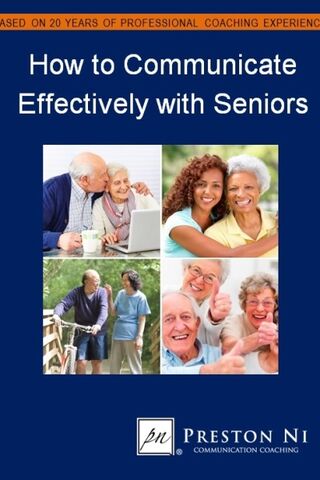Motivation
5 Ways to Motivate and Encourage Seniors
Setting goals can be beneficial for many older adults.
Posted March 15, 2015 Reviewed by Jessica Schrader

Author's Note: The following is an excerpt from my book: “How to Communicate Effectively with Seniors”.
The post-World War II Baby Boomer Generation (born 1946-1964) is reaching their senior years in ever-growing numbers, and representing an increasingly larger segment of the population. Higher standards of living and medical advancements are extending life expectancies in many countries to well above the age of 80.
Caring for and having successful relationships with older adults often require unique interpersonal skills and strategies. Below are five ways to encourage and motivate older adults.
1. Encourage Few and Manageable Goals
Primary Needs Fulfilled: Independence, Relevance.
Secondary Needs Fulfilled: Companionship, Security.
Young people and adults in their prime are frequently reminded to set and accomplish goals. Goals can be beneficial for many older adults as well. Being goal-oriented can instill motivation, a sense of purpose, and pride in accomplishment. In the cases of seniors, create few and manageable goals daily, be it doing ten stretches, completing a small craft project, or something as simple as finishing a cup of juice. Facilitate and assist along the way. Offer encouragement with each baby step, and compliment when the task is complete. Being acknowledged for completing a seemingly simple task (to us) can sometimes make a senior’s day!
2. Encourage Affirming Self-Identify
Primary Needs Fulfilled: Relevance.
Secondary Needs Fulfilled: Companionship, Emotional Security.
"Many, many elderly have such fascinating life stories. If only someone would listen."
It may be hard for some to imagine, but every older adult was at one time young, and likely full of energy, passions, ambitions, and dreams. Their younger days, if you care to ask them, were often full of adventures, romances, and many other tales from their book of life. Many, if you only care to learn, would be happy to share stories with you, show you pictures and objects, and reminisce in the glories of their past.
If the older adult lives away from her or his own home, such as at a long-term care facility, surround the living environment of the senior with positive memory anchors such as photos, postcards, posters, artifacts, fragrances, music, movies, trophies, honors, and awards, etc. Let these items increase the richness of the older adult’s living environment, and serve as easy conversation topics. If you’re a family member, with each visit bring one or two items that may help the older adult evoke pride or fond memories from the past. Ask questions, and listen to the tales.
Encouraging an older adult to construct her or his biography by articulating an oral and/or written history is a wonderful form of psychological resourcing which keeps the elderly cognitively, emotionally and socially active. It enhances self-esteem and uplifts the spirit. As you listen to the stories, ask questions to deepen the rich and vivid details of their recollections. Watch her face light up and her smile widen as she shares her tale.
3. Encourage Technologies
Primary Needs Fulfilled: Companionship, Relevance.
Secondary Needs Fulfilled: Independence, Security.
The internet and social networking are wonderful opportunities for older adults. More and more seniors are connecting with family and friends via technology. Family and friends, in turn, often find such connections convenient and less stressful. In addition to social benefits, on-line connections also provide regular chances for family and friends to “check in” on the seniors’ physical, mental, and emotional well-being that would otherwise not be possible. Connecting on the internet does not replace the physical intimacy and emotional closeness that may come with face to face interactions. However, many older adults would feel much more alone without social networking. Studies show that social networking platforms that were once populated primarily by young people are now increasingly embraced by older adults.
4. Encourage the Feeling of Usefulness
Primary Needs Fulfilled: Relevance, Independence.
Secondary Needs Fulfilled: Companionship, Security.
Many cognitively active older adults want to feel a sense of usefulness, even if their physical functions are limited. Identify and introduce conversational topics or tasks where the senior can feel wanted and needed. For example:
- Ask them for advice on practical as well as important life matters. Converse with them like they’re mentors.
- Ask for their opinions on certain decisions you need to make.
- Introduce manageable projects or tasks for them to be in charge of where they’ll feel a sense of accomplishment.
5. Encourage Adaptive, Flexible Coping skills
Primary Needs Fulfilled: Independence, Security.
Secondary Needs Fulfilled: Relevance.
As an older adult experiences increased cognitive and/or physical limitation, facilitate various types of coping skills to help the senior adjust with dignity. These can include:
- Fewer but workable goals as previously mentioned.
- Divide and conquer: break tasks down into baby steps that are more manageable.
- Assist the senior in identifying more realistic goals.
- Assist the senior in selecting alternative means to accomplishing goals.
- Allowing the senior to do what she’s able, while helping just enough to complete a goal.

For more tips on how to communicate effectively with aging adults, including those who may be difficult to deal with, see my book, “How to Communicate Effectively with Seniors” and “How to Communicate Effectively with Highly Sensitive People”.
© 2015 by Preston C. Ni. All rights reserved worldwide. Copyright violation may subject the violator to legal prosecution.




